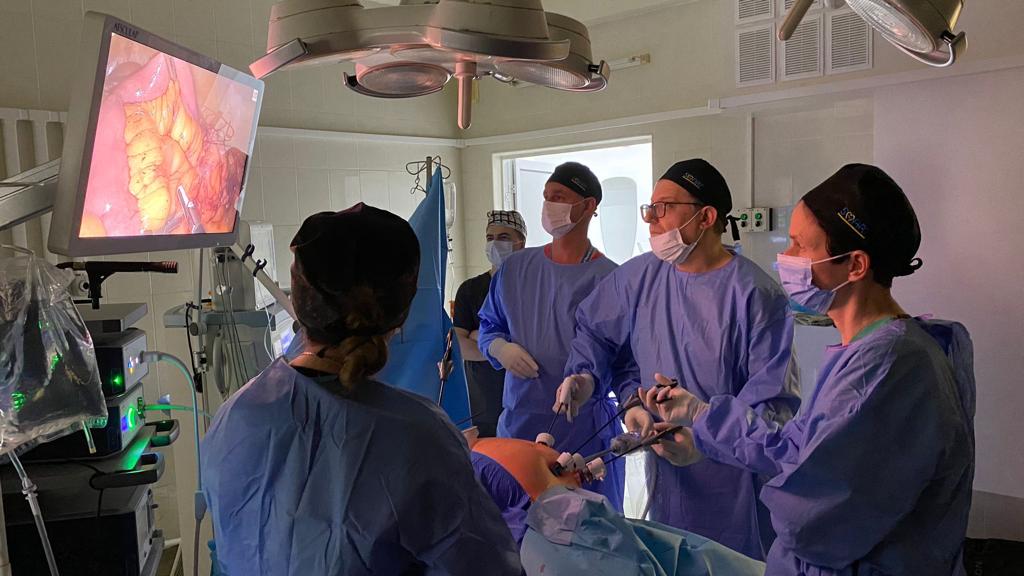Nottingham surgeons train Ukraine medics in keyhole surgery

Two Nottingham surgeons have been training medics in war-torn Ukraine to perform keyhole surgery.
Charles Maxwell-Armstrong and Katie Walter – both colorectal surgeons for Nottingham University Hospitals NHS Trust (NUH) – were part of a six-strong cohort delivering training in a hospital in Lutsk in the north-west of the country.
Medical resources – staff and supplies – have been mainly deployed to support the victims of war, which is impacting on the treatment of non-war related medical needs, such as cancer.
Katie said: “The doctors told us stories of how, at the start of the conflict, many senior doctors, had fled the country leaving them in charge, how they had received donations of kit and medical equipment from around the world but this was not always kit they knew how to use or needed, and how they are still short of many supplies.
“Many of the doctors left in charge were three or four years out of medical school and working very long hours covering understaffed units. Those working near the frontline were clearly scarred from the atrocity and trauma they had witnessed.”
The visit included two days of basic laparoscopic training for junior surgeons, with hands-on simulations, before moving on to three days of advanced training in laparoscopic colorectal surgery with teaching and live video links to the operating theatres watched by 150 surgeons from all over the country.
Charles said: “Operating in a foreign theatre in the middle of a war zone, in front of 150 Ukrainian surgeons, on patients you’ve never really met, with equipment you’ve had to scrape together, and with a team you’ve never worked with – where very few people spoke English – it was a challenge.
The group met with the Ukrainian Minister of Health, Viktor Liashko, to press home the need to make it a national, funded programme. They are hoping to return to Ukraine in June to continue their work.
“In terms of laparoscopic skills, they are where we were around 15/20 years ago,” said Charles. “To go from open surgery to keyhole is about 25 operations; each colorectal surgeon has to have their hand held for 25 operations. They want to learn, we’re happy to teach.”
Lutsk is in the north-west of Ukraine, miles from the fighting, but the war was ever present. With large gatherings banned, registration onto the training was done by word-of-mouth.
“Something that made us nervous was that hospitals do get bombed in Ukraine,” said Charles. “We had to be really careful – you put 150 colorectal surgeons in one place and one strike could wipe out a generation of surgeons.
The visit was organised by SMART Medical Aid, a Dutch-Ukrainian charity set up in 2014, and aimed to establish a formal teaching programme for Project IOLE (Improving Outcome in Laparoscopic Surgery by Education), which has been approved by the Association of Coloproctology of Great Britain and Ireland (ACGBI) and the Royal College of Surgeons of England.
The Project was created by Gianluca Colucci, who was a Fellow in NUH in 2015, and is now a senior lecturer at the Brighton and Sussex Medical School (BSMS), and consultant surgeon at University Hospitals Sussex NHS Trust.
Katie – who worked alongside surgeon Nicola Eardley, Education and Training Committee Chair of the ACGBI to support and promote women in surgery – said: “We hear about so many people affected by the conflict in the news every day and yet it can be difficult to know what you can do to help so it was good to have the opportunity show support.
“It is clear that the inevitable stress that comes with living in a country at war adds a chronic, inescapable pressure to their lives. Large gatherings are banned, there is a 10pm curfew, roads are littered with anti-tank “hedgehogs”, windows are taped to limit shatter-damage, bomb sirens are going off and mobile phone bomb apps ring alerts throughout the day.
“The hospital we taught in was surrounded by armed soldiers on the day we left as it prepared to take a convoy of wounded soldiers arriving by special evacuation trains from the front-line.”
Both Charles and Katie paid tribute to the resilience of the Ukrainian people.
“I’ve come back with immense respect and admiration for the strong and resilient people and a desire to do something more to show them my support,” said Katie.
“The people were very welcoming and went out of their way to look after us. Parents told us of the fears they have for their families. They told us how they wake their children in the night to head to shelters, or spend nights on the floor in their bathroom comforting their children sleeping in the bath (deemed the safest place in the house to offer protection in a blast).
“We were asked ‘What are people saying in Europe? Have they forgotten about us?’”
“I’ve never known anything like it before,” said Charles. “What sticks with me about the visit is the sheer resilience of the people. At Queen’s (Medical Centre), I’m not trying to deliver a service in the middle of a war zone with no kit. No one is trying to bomb me. It just really puts things into perspective.”
Caption: The UK surgeons (L-R) Tony Miles, Ken Campbell, Nicola Eardley, Katie Walter, Gianluca Colucci
Caption: Charles Maxwell-Armstrong and Katie Walter operating in theatre
Caption: Students practising in a dry lab
Caption: Ukrainian Health Minister Viktor Liashko tries the equipment






